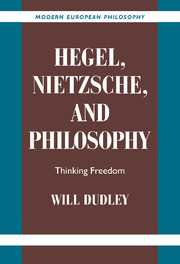Introduction: Freedom and Philosophy
Published online by Cambridge University Press: 09 July 2009
Summary
No idea is so generally recognized as indefinite, ambiguous, and open to the greatest misconceptions (to which therefore it actually falls a victim) as the idea of freedom: none in common currency with so little appreciation of its meaning.
HegelThe Significance of Freedom: From Politics to Philosophy
Hegel's remark is as true today as it was 170 years ago: freedom, one of our most common and powerful concepts, is used (and misused) with extraordinarily little appreciation of its significance. Worse, Hegel is wrong to say that freedom's openness to misconception is “generally recognized.” Not only is freedom poorly understood, but we are falsely confident that we do understand it. This doubly unfortunate condition dissuades people from undertaking needed investigations into the meaning of freedom.
Such investigations are needed because, across much of the world, the concept of freedom plays an important role in the organization of people's lives. People strongly desire freedom, and therefore support governments, programs, policies, and candidates that they perceive to advance its cause. But what people perceive to advance the cause of freedom depends upon what they understand freedom to be. And thus what people understand freedom to be, even if their understanding is not explicitly articulated, matters a great deal to the way they live. As Robert Pippin has put it:
Modern agents can be said to be by and large committed to the right, truly authoritative modern norm, freedom, and so an equal entitlement to a free life, but suffer from the indeterminacy that the mere notion of freedom leaves us with. (As the twentieth century has made clear, libertarian, welfarist, socialist and totalitarian projects all claim a commitment to the supreme principle of freedom.)
- Type
- Chapter
- Information
- Hegel, Nietzsche, and PhilosophyThinking Freedom, pp. 1 - 12Publisher: Cambridge University PressPrint publication year: 2002



